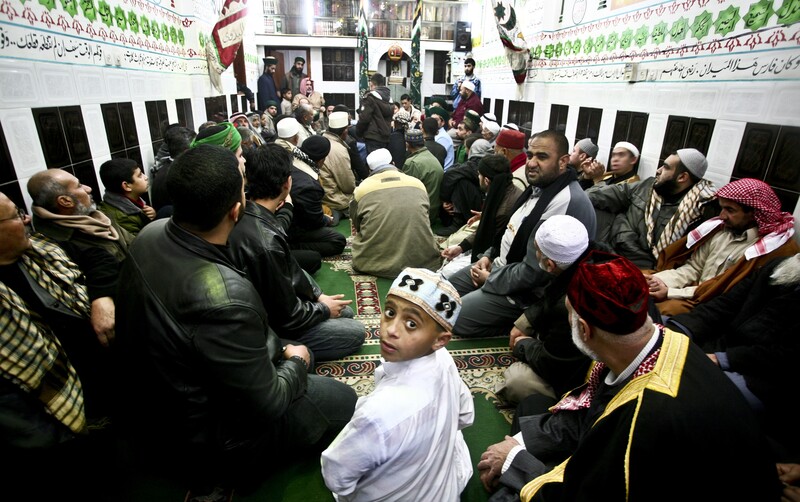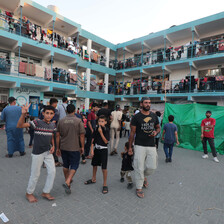The Electronic Intifada Nuseirat refugee camp 6 July 2016

Palestinians celebrate the birthday of the Prophet Muhammad at the Rifaiya gathering in al-Nuseirat refugee camp in February 2012.
APA imagesNabhan al-Babili assembles his followers every night in the Nuseirat refugee camp in Gaza. The 62-year-old is the head of Gaza’s al-Rifaiya order of Sufi Islam, a position that was held by his father, Abdullah, and his grandfather, Abdulqader, before him.
It is at such nightly gatherings, in a space richly decorated in green and Islamic calligraphy, and the larger weekly hadrat gatherings, that al-Babili leads his followers, or murids, in a spiritual journey of revelation.
The evenings include singing and poetry recital. Abu Omar, 60, a regular at these gatherings, speaks with a trembling voice but does not hesitate to take the microphone to recite traditional Sufi verse to the great pleasure of the assembled murids:
“Oh rider of white camels stop by us so that we could bid them farewell. Oh rider, death is when you travel.”
Abu Omar, who asked only to be identified by his informal name, also happily breaks into a song by Yassin al-Tohami, a popular Egyptian Sufi singer:
“Love is from you and to you. You granted me a trembling heart that loves. I am fond of everything you made, so how come I do not love you?”
These are special nights to those assembled, especially during Ramadan. They invoke, said Abu Omar, the spirit of Sufism: “purifying and healing the soul.”
Good relations
Like the vast majority of the estimated 1.9 million Palestinians in Gaza, the Babilis are refugees. The family was displaced in 1948, along with hundreds of thousands of other Palestinians who fled or were expelled as Zionist militias overran their country.
Abdullah passed down to Nabhan their Sufi traditions, which he has maintained in the less than conducive environs of the refugee camp that became their home. They carried the order’s bells and flags with them in 1948 and they wield them to this day.
Theirs is a Palestinian Sufi order that goes back to the arrival in Palestine of the teachings of the 12th century Persian-born, Baghdad-educated Sheikh Adulqader al-Rifai al-Jilani, according to al-Babili. The sheikh spent 25 years wandering in the desert regions of Iraq before it is believed he may have come to Palestine.
The Rifaiya are just one of several Sufi orders in Palestine. According to al-Babili, the al-Qadiriya, al-Ahmadiyy, al-Dusuqiya, al-Shaziliya and al-Darqawiya orders have all been active in Palestine for hundreds of years and maintain good relations among themselves and with the wider Muslim communities — not just in Gaza, but in the West Bank and inside present-day Israel.
Just three months ago, al-Babili said, he visited followers and students in the West Bank, and in 2014 he managed to attend the Nabi Musa celebrations in the deserts above the Jordan Valley in that territory.
The seven-day Nabi Musa festival is regarded as the most important Muslim pilgrimage in Palestine and takes believers from Jerusalem to what is considered to be the tomb of the prophet Musa (Moses) in Jericho.
But the nearly decade-old siege on Gaza has also impacted the Sufi leader, who said he had been unable to attend Sufi gatherings in Algeria and Malaysia in past months.
Sufi orders generally do not have political agendas and in Palestine have maintained good relations with different political parties.
“We focus only on celebrating religious occasions,” said al-Babili.
This spiritual focus has stood them in good stead despite clear ideological differences with more conservative Muslim groups such as Salafists in Gaza.
“The nature of Sufism has allowed them to maintain good relations with other Islamic groups,” said Mustafa al-Sawaf, a former editor of the Falasteen newspaper, a daily affiliated with Hamas, and a close observer and Gaza-based expert of Islamist political movements. “They are open to other groups, and welcoming to all. They focus on performing their own rituals.”
In contrast to the austere view of other Muslim trends taken by Salafists — the Islamic State group, an extreme strand of Salafi belief, has accused Sufis of apostasy and targeted Sufi shrines in Syria and Iraq — Sufis shy away from conflict with other Muslims. In Gaza, said al-Sawaf, “these differences are not seen because Sufism avoids conflict with other groups. They do not have any issues with others and welcome all.”
Spiritual quest
Exact figures are hard to come by, but estimates suggest there are just a few thousand Sufis in Gaza. According to Adnan Abu Amer, a professor of political science at the Ummah University in Gaza, “compared to others, they are neither numerous nor politically active.”
“They don’t want to be seen supporting one party over another, and this gives them freedom to work and move,” Abu Amer said.
In the Gaza Strip, mosques are often dominated by specific Islamic groups such as Hamas or Islamic Jihad, impacting where worshipers choose to perform prayers. This is not the case for Sufi schools and their places of worship, where Palestinians from different backgrounds visit, including religious leaders from different Islamic groups in the Gaza Strip.
The practice and rituals of Sufis have also drawn criticism from some conservatives, who believe that they violate the original teachings of Islam, a criticism Sufis reject.
For Musa Shukur, 30, a local vendor, Sufi gatherings are about “meeting spiritual people with good hearts, and healing the soul. Here I can lose myself to the chants of Islamic hymns.”
The spiritual element is strongly felt during Ramadan, when Sufi rituals attract more people than usual. And perhaps in Gaza, where siege and successive Israeli wars have made life difficult, there is an extra need for a connection with the divine that goes beyond the physical, a connection that Sufi rituals aim to make.
“What is salvation when my body is tied to my soul?” sings Abu Omar, a question that is perhaps more pressing for those facing the precarious existence of Gaza.
Yousef M. Aljamal is a writer based in Gaza.



